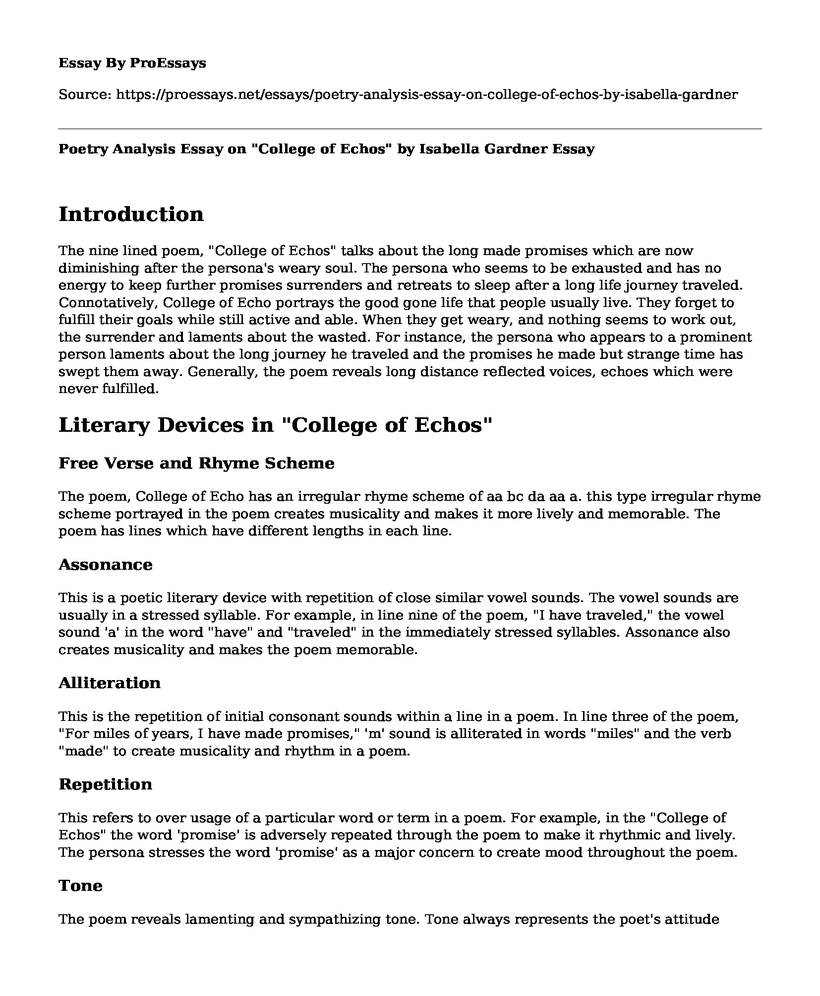Introduction
The nine lined poem, "College of Echos" talks about the long made promises which are now diminishing after the persona's weary soul. The persona who seems to be exhausted and has no energy to keep further promises surrenders and retreats to sleep after a long life journey traveled. Connotatively, College of Echo portrays the good gone life that people usually live. They forget to fulfill their goals while still active and able. When they get weary, and nothing seems to work out, the surrender and laments about the wasted. For instance, the persona who appears to a prominent person laments about the long journey he traveled and the promises he made but strange time has swept them away. Generally, the poem reveals long distance reflected voices, echoes which were never fulfilled.
Literary Devices in "College of Echos"
Free Verse and Rhyme Scheme
The poem, College of Echo has an irregular rhyme scheme of aa bc da aa a. this type irregular rhyme scheme portrayed in the poem creates musicality and makes it more lively and memorable. The poem has lines which have different lengths in each line.
Assonance
This is a poetic literary device with repetition of close similar vowel sounds. The vowel sounds are usually in a stressed syllable. For example, in line nine of the poem, "I have traveled," the vowel sound 'a' in the word "have" and "traveled" in the immediately stressed syllables. Assonance also creates musicality and makes the poem memorable.
Alliteration
This is the repetition of initial consonant sounds within a line in a poem. In line three of the poem, "For miles of years, I have made promises," 'm' sound is alliterated in words "miles" and the verb "made" to create musicality and rhythm in a poem.
Repetition
This refers to over usage of a particular word or term in a poem. For example, in the "College of Echos" the word 'promise' is adversely repeated through the poem to make it rhythmic and lively. The persona stresses the word 'promise' as a major concern to create mood throughout the poem.
Tone
The poem reveals lamenting and sympathizing tone. Tone always represents the poet's attitude toward the subject, and sometimes the readers. The persona is lamenting, and sympathizing tone portrays his attitudes towards the unfulfilled promises which he made. He feels sorry for his situation, "My sleeves are raveled."
Stanza
The poem has nine lines which differ in length depending on the rhyme to be created.
Allegory
The poem, "College of Ethos" is a short verse with significant moral lessons. The persona of the poem is an adult civil servant who is retiring from his duty uses the short verse to pass a meaningful lesson to the readers. In line one of the poem, he laments, "I have no promises to keep." this means that his weary and ending the duties he had been assigned. Generally, every poem has a voice that communicates to readers or listeners. The voice represents the persona, the person telling the poem who is far from the poet.
Enjambment
The poem portrays lines which continue from the immediate ones. This device is used to trick readers. The poet uses this device to create a continuation as well as lead readers to have a chronological development of ideas within the poem without pause.
Flashback
The persona uses his experience to ascertain the current situation. his lamentations reveals how his past life was and why he regrets failing to accomplish his promises as he had thought.
Works Cited
Isabella Gardner. "College of Echos" 2014
Cite this page
Poetry Analysis Essay on "College of Echos" by Isabella Gardner. (2022, Dec 12). Retrieved from https://proessays.net/essays/poetry-analysis-essay-on-college-of-echos-by-isabella-gardner
If you are the original author of this essay and no longer wish to have it published on the ProEssays website, please click below to request its removal:
- Literary Analysis Essay on Children of the Sea by Edwidge Danticat
- Daniel Quinn's Ishmael Essay Example
- Events at Macbeth's Coronation Essay
- King Lear by William Shakespeare Essay Example
- Analysis of Araby by James Joyce Essay Example
- Essay on the Characterization of the Duke Within Robert Browning's "My Last Duchess"
- Essay Example on Robert Browning's Dramatic Monologues: The Noble Quest for Precision







